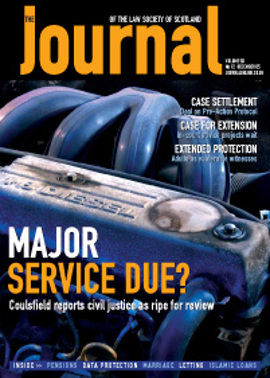Appealing prospects

Death by careless driving?
There is more than one reason for mentioning the case of Barclay v HMA 2005 GWD 30-586. First, it is a case involving dangerous driving causing death in which a sentence of four years’ detention was imposed. It will be well known by now that there is a proposal on the part of the legislature to introduce an offence of causing death by careless driving, for which the maximum penalty will be five years’ imprisonment. The matter, being reserved, is one for the UK Parliament. The reasons why such a law should not be passed are well recognised and form part, for example, of an excellent paper on the subject by Sheriff Linda Ruxton. The reason for mentioning the matter here is that such a step would bring enormous and unnecessary problems for everyone involved. In this context we will pass over in silence, leaving it to others to comment as they may see fit, the recent statement by a government minister that “we are on the side of the victims”.
The next reason for looking at the case is that it affirms something occasionally misunderstood, namely that when evidence is led in a case and one of the charges is subsequently withdrawn, evidence given in connection therewith is not thereby somehow withdrawn as well, but remains before the court for whatever relevant purpose it may have. In the instant case, the appeal court held, as it happens, that such evidence was relevant as regards sentencing.
Inferences from silence
The problems raised by police interviews have, over the years, been many and varied, but in Larkin v HMA 2005 GWD 30-564 the difficulty which led to the conviction being quashed on appeal stemmed from part of the judge’s charge. The case was one of being involved in the supply of ecstasy; in the course of parts of a police interview the appellant replied “No comment.” The sheriff’s directions had the effect of leaving it open to the jury to draw an adverse inference from this. The jury, said the appeal court, were not entitled to make any such inferences: in terms of section 149 of the Criminal Procedure (Scotland) Act 1995 the appellant, as a detainee, was not obliged to answer any question beyond giving his name and address. Such a misdirection was held to be material and the appeal was allowed.
Ignore, or direct to ignore?
In another case involving an alleged misdirection, this time unsuccessfully appealed, namely A v HMA (No 1) 2005 GWD 30-566, the appeal court had something to say about the circumstances in which a judge should refer in his or her charge to irrelevant and possibly prejudicial evidence. (Older readers may remember that the late Lionel Daiches QC used to speak of this as throwing a skunk into the jury room and instructing the occupants to ignore the smell.) What had happened was that in the course of a trial involving charges of indecency a police witness disclosed that the appellant had been charged with two counts of sodomy. A defence motion to have the trial deserted on the ground that this had caused prejudice to the accused was refused, the sheriff taking the view that the matter could be dealt with by an appropriate charge. In that charge, the jury were reminded that they were to consider the charges before them only; no specific reference was made to the sodomy matter, the judge taking the view that to do so might lead to the heightening of the jury’s consideration of that evidence. On appeal it was argued that a specific direction to ignore what the police officer had said should have been given. The appeal court held that it was within the discretion of the trial judge to say something or nothing and that it was within this discretion to take the view that to say something would run the risk of creating prejudice. This situation is an odd one, for had the judge decided to do as the appellant subsequently argued (and accordingly must have thought was correct at the time of the charge), the judge could have effectively covered himself against appeal while creating that very prejudice which the appeal court later held that he had correctly avoided. It was also held, incidentally, that the police officer’s evidence dealt with an allegation about, rather than with the commission of, a crime.
Du Plooy revisited
Smith v HMA 2005 GWD 33-630 offers a pretty pure example of the Du Plooy principles at work and is something of a blow for the “One third off as long as you plead at the intermediate diet” school of thought, which took the perhaps old fashioned view that that point was likely to be the first time the accused would have had the benefit of a legal mind assessing the prosecution case on his or her behalf. Here both S and L had committed a similar breach of the peace. S pleaded guilty at the first calling and L at the intermediate diet. Both were fined £150. The appeal court took the view that the utilitarian value was greater the earlier an accused pleaded guilty and S’s fine was reduced to £100. Now, no one wants to be alarmist, but to offer a discount for pleading before a lawyer has seen how bad the case against you is, does seem to raise some issues about the difficulties involved in taking legal advice at all, especially about a concept as slippery as breach of the peace. Arithmetic can be tricky too: if S ended up with two thirds of what L got, that could be seen as a discount of one third, except that that would mean L got no discount for his reasonably early plea. So assuming that L got a discount as well, shall we say of one quarter, then that would put the base figure at £200 – which would mean that S ended up with a one half discount. Or am I missing something?
Full benches in prospect
It should be noted that there are two five-judge cases on the way. The first involves an interesting and important point about provocation. The earlier part is reported as Gillon v HMA 2005 GWD 33-627. Put briefly, the point at issue is whether there is a rule of law that for provocation by assault to lead to a conviction for culpable homicide rather than murder there should be a reasonably proportionate relationship between the violence originally offered by the (subsequent) victim and the violence used by way of reaction by the accused. Reference was made to the opinion of the Lord Justice General in Drury v HMA 2001 SLT 1013 and the analysis there to be found of the relationship between provocation and murder.
Beaton v HMA 2005 GWD 35-658, also remitted to a full bench, involves the abandoning of appeals after the case has called but before arguments are presented. The appeals in question were to raise the point that the sentencing judge might not have given an appropriate discount. It was argued that an appellant should be able to intimate orally the abandoning of an appeal and that this should have the same force as the lodging of a formal notice. In continuing the case the court observed that it was at least arguable that an appellant who had obtained leave to exercise a right to appeal had also a right to abandon that appeal so long as the court was not asked to deal with it. Watch this space – unless you want to know the outcomes rather sooner!
Basis of appeal
By way of conclusion, it is worth noting that in a couple of recent cases in which appeals against sentence were allowed, the sentencing court might well have been excused had the question been posed, what are we supposed to have done wrong? In Boath v HMA 2005 GWD 35-659 a sentence of three years in respect of culpable and reckless fireraising was halved, but no explanation is really given as to why the appellant is judged to have got twice as much as he should have, beyond the characterising of the sentence as excessive. The result, a good one for the appellant no doubt, does not really suggest what principles should be applied in such circumstances.
The other case is Campbell v HMA 2005 GWD 35-662, which was an appeal against a sentence of four months’ imprisonment in respect of a charge of possessing indecent computer pictures of a child. In allowing the appeal and substituting a sentence of three years’ probation, the appeal court said in terms that the sentencing sheriff was not being criticised for the position that he took. That being so, it is difficult to say why the sentence was said to be wrong and thus one that could be appealed against successfully. Assuming however that the appeal court is here truly acting as a review court, other questions do arise. First, if review rather than appeal is being carried out, then should not that be so in all cases in which the original sentence is complained of? Further, the substituting of the appeal decision seems to have been on the basis that the new sentence would afford rather more public protection, being one that involved a lengthy period of supervision rather than a short period in custody. The question of whether a sentence should be such as to achieve a distinct objective rather than to impose condign punishment is one on which there has been a considerable amount of debate, more or less informed. In the circumstances it would have been helpful, perhaps, had the principles involved been spelled out.
In this issue
- Holes in Scotland's corporate killing proposals
- A month of contrasts
- Too small to be flexible?
- Engine overhaul
- Vital voices revisited
- Letting in the law
- Puzzles and paradoxes
- Legacy giving in a Scottish climate
- New deal for PI claims
- Data protection crackdown: do you comply?
- In real terms
- Access route
- Better law-making: just lip service?
- Appealing prospects
- The limits of diversification
- Cashing in on the event
- Farewell then common law marriage
- Scottish Solicitors Discipline Tribunal
- Website reviews
- Book reviews
- Unveiling the Islamic mortgage






